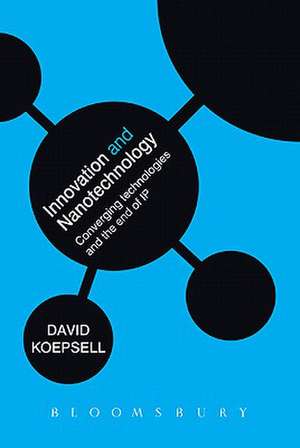Innovation and Nanotechnology: Converging Technologies and the End of Intellectual Property
Autor Prof. David Koepsellen Limba Engleză Hardback – 31 mai 2011
Preț: 540.38 lei
Preț vechi: 689.23 lei
-22% Nou
Puncte Express: 811
Preț estimativ în valută:
103.40€ • 108.25$ • 85.56£
103.40€ • 108.25$ • 85.56£
Carte tipărită la comandă
Livrare economică 07-21 aprilie
Preluare comenzi: 021 569.72.76
Specificații
ISBN-13: 9781849663434
ISBN-10: 1849663432
Pagini: 256
Dimensiuni: 156 x 234 x 23 mm
Greutate: 0.54 kg
Editura: Bloomsbury Publishing
Colecția Bloomsbury Academic
Locul publicării:London, United Kingdom
ISBN-10: 1849663432
Pagini: 256
Dimensiuni: 156 x 234 x 23 mm
Greutate: 0.54 kg
Editura: Bloomsbury Publishing
Colecția Bloomsbury Academic
Locul publicării:London, United Kingdom
Caracteristici
This book is unique in that it's a blend of several areas that are usually not combined and that are all gaining increasing importance: nanotechnology, intellectual property, and open source/open information
Notă biografică
David Koepsell is currently Assistant Professor of Philosophy at the Delft University of Technology, the Netherlands. He is the author of Who Owns You?: The Corporate Gold Rush to Patent Your Genes and Science and Ethics: Can Science Help us Make Wise and Moral Judgments? Also an attorney, his recent research focuses on the nexus of science, technology, ethics and public policy. He has previously held posts at Yale University, SUNY at Buffalo and the University of Antigua.
Cuprins
Let's Get Small; Nanotechnology and the Future; Nano-Present; Laws, Rules and Regulations; Things in Themselves: Objects, Ideas and Intentions; Authorship and Artifacts; Economics, Surpluses and Justice; Nanotech Nightmares; The Final Convergence
Descriere
This title presents explores how emerging nanotechnologies demand a new approach to scientific discovery. It develops a theory of authorship, artifacts and intentionality in relation to public policies and institutions. It concludes that localized manufacturing, distributed design and nanotechnology call into question intellectual property regimes.
